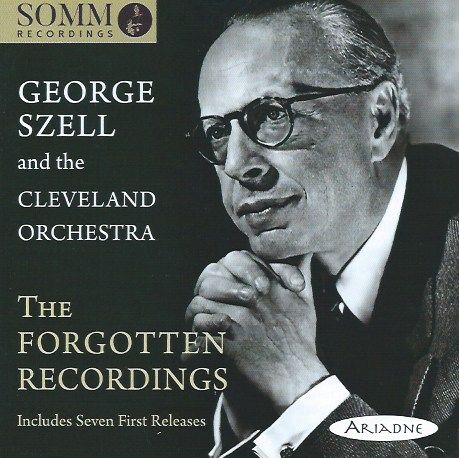George Szell and the Cleveland Orchestra: The Forgotten Recordings

This is a major release of historical recordings that at once reminds us of the stature of George Szell and his superb Cleveland Orchestra while also filling out our picture of their collaboration.
The monolingual booklet comprises an extended essay by Lani Spahr on Szell himself. We hear how Szell studied with Richard Robert (teacher also of Rudolf Serkin and Haskil) and composition with Eusebius Mandyczewski (friend of Brahms) and with the composer Max Reger. But his heart lay in conducting; substituting for a conductor with the Vienna Symphony Orchestra as a teenager initiated a path that led to recognition by Richard Strauss, who introduced Szell to the Berlin State Opera; at 20, again on Strauss' recommendation, he took over the Strasbourg Municipal Theatre, moving on to a variety of posts, including the New German Theatre in Prague. In America, he debuted with the St Louis Symphony.
Szell decided to wait out the increasingly troubled political situation in Europe over in the States. Guest appearances with the Los Angeles Philharmonic, the NBC Symphony and the Met all followed. Impressed by the Cleveland Orchestra under Artur Rodziński (a conductor we should return to on Classical Explorer; his recordings certainly merit attention), Szell was finally appointed to the orchestra, his first commercial recordings dating from 1947.
On Columbia's cheaper Epic subsidiary, Szell and the orchestra released two Haydn symphonies (Nos. 88 and 104). The genesis of the present twofer, though, is interesting: these recordings were put down for the Book of the Month Club (BOMC), a subscription club. One one side of an LP was the work in question; on the flip side, a spoken analysis.
Recorded Christmas Eve in the Masonic Auditorium, Cleveland, Ohio, the Bach Orchestral Suite No. 3 is certainly not what we would today call HIP (Historically Informed Performance); it is very much of its time, modern symphony orchestra (albeit somewhat reduced); big and brash. Yet it holds a remarkably tender Air (the famous "Air on the G-String") at a time when this could sound like sub-Mahler!:
Szell's only other Bach on record is two Violin Concertos, one with the great Zino Francescatti (BWV 1042, 1953) and the equally great Szigeti (BWV 1056, 1954).
The sheer beauty of Szell's 'Vltava' ('Die Moldau' in German) from Smetana's Má vlast, recorded on the same day as the Bach, is fabulous. Tender to begin with, and rising to a fervidly dramatic climax, this is a powerful reading that makes one want to hear the whole cycle under Szell. Each section of 'Vltava' is powerfully characterised, the whole beautifully atmospheric. And the amazing thing is that he climaxes do not distort (as one might expect them to from a recording of this vintage; all credit to Lani Spahr, who as well as providing that fabulous booklet note acted as Producer and Audio Restorer for this release):
That sense of story-telling, of narration, is clear again in a sharply-etched Richard Strauss Till Eulenspiegel. I love how Lani Spahr's booklet notes isolate that the third horn solo at 8'45 was played by Myron Bloom, who was later to become a legendary principal with the orchestra:
Strauss' retelling in sound of the medieval rascal Till Eulenspiegel, his antics (the full title is Till Eulenspiegels lustige Streiche: Till Eulenspiegel's Merry Pranks) and his demise is both deft and masterly. Szell revels in each and every gesture.
All the pieces so far have been in mono; the sessions in October 1955 (everything after the Strauss) were taken down in stereo. Szell's discipline is everywhere apparent in the taut Mozart Symphony No. 39; while conductors such as Karl Böhm might find more suave phrasing at times in the first movement, there is much to be gleaned from Szell's performance. I like the detail here, too: one can hear the woodwind, so important in Mozart, beautifully, while the slow movement has a sheen of gallanterie:
The discipline of the finale is remarkable, the Cleveland Orchestra on its most alert form.
The second disc puts us more in core Szell territory: Brahms and Schumann (followed by Stravinsky). For all the discipline, there is a lovely warm spring breeze that allows the music to bend in the more lyrical sections of the Academic Festival Overture (and what detail we hear, from counterpoint we might not have noticed before to a tricky horn semiquaver passage that often gets buried). Again, a word on the transfer: creditably, the high strings show no sense of overt shrillness or distortion. It is followed by a blazing performance of the Haydn Variations (perhaps the Grazioso variation, Variation VII, could bend in the wind a little):
But the true gem here is Schumann's Fourth Symphony (1851 version), a performance where rigour meets tenderness. Try the robust third movement, or the pliant second. But it is the mystery of the 'Langsam' (Slow) opening of the finale that is perhaps most impressive before the music bursts into life at the finale proper:
Finally, Stravinsky. From the almost inaudible opening, this is going to be a fine performance. Szell's more famous recording dates from six years later than this one; but there's a freshness here that is most appealing. Unsurprisingly, the virtuosity is high-heat:
... and maybe we should close with the Finale, the horn singing the tune at the opening, Szell timing the ensuing build-up impeccably:
Admittedly this finale strains the recording a touch, but no-one should be without that high-octane brass against fervent trills.
A fascinating release.
